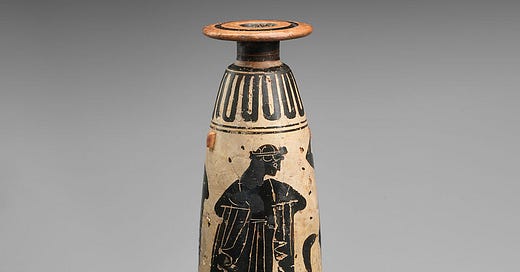January 405 BC, Athens. The dramatic festival is in full swing, and the greatest comedian of the day, Aristophanes, is staging his fifteenth comic play, The Frogs.
In the play, the god Dionysus, presented as a comic buffoon, has gone down to the Underworld in search of a great tragedian, since no surviving ones satisfy him. There he stages a contest between two dead playwrights, Aeschylus and Euripides - the former traditional and grand, the latter modernistic and subversive. In the course of the contest, Aeschylus tells Euripides that he can destroy his verses with a single phrase - a comic phrase with an uncertain but probably sexual double entendre meaning ‘he destroyed his perfume flask (lekythion apôlesen)’. The shape of a typical flask, made to contain oil, perfume, balm, and so on, (see above, from the Metropolitan Museum of Art in NY) is undoubtedly phallic, and the joke may lie in the potential use of such objects as dildoes by aficionados of both sexes.
It’s hard to find an equivalent in English, though comics today still use repeated comic interjections such as ‘up yer bum’ to bring down the level of discourse and inject absurdist humour. The rhythm of the Greek phrase (- u uu u - u -) is equivalent to “lost his bottle of balm, ‘e did!”
When Euripides recites from his first prologue, he quotes (Frogs 1206-8):
"Aegyptus, as the widespread fable tells the tale, Along with fifty sons, his long-oared boat amid, Landing near Argos”— Aeschylus (interjects): "Lost his bottle of balm, 'e did!"
Εὐριπίδης 'Αἴγυπτος, ὡς ὁ πλεῖστος ἔσπαρται λόγος, ξὺν παισὶ πεντήκοντα ναυτίλῳ πλάτῃ Ἄργος κατασχών'— Αἰσχύλος 'ληκύθιον ἀπώλεσεν'.
Annoyed, Euripides quotes a second set of lines from another prologue (Frogs 1211-13) - with the same inevitable result:
“Dionysus with his ivy club, in fawn-skin clad, Who down Parnassus' hillsides through the pines doth bid To dance enraptured"— Aeschylus: "Lost his bottle of balm, 'e did!"
‘Διόνυσος, ὃς θύρσοισι καὶ νεβρῶν δοραῖς καθαπτὸς ἐν πεύκαισι Παρνασσὸν κάτα πηδᾷ χορεύων’— Αἰσχύλος 'ληκύθιον ἀπώλεσεν'.
A suitably scurrilous equivalent for today might be ‘and stuck a ferret where the sun don’t shine’. This could be adapted for use with the ancient prologues:
"Aegyptus with his fifty sons, we learn,
Alit near Argos in his boats of pine”—
and stuck a ferret where the sun don't shine!
It is also suitable for undercutting verse in English iambics. We might, for instance, imagine the contest as being between Webster (as Euripides) and Shakespeare (as Aeschylus):
Webster: 'He was an excellent courtier, and most faithful, Who kept his counsel yet gave counsel fine"– Shakespeare: 'and stuck a ferret where the sun don't shine!' Webster: 'She was an excellent lady, and much loved, Who spoke a truth no doctrine could define" – Shakespeare: 'and stuck a ferret where the sun don't shine!'
While the ‘Webster’ verses above are based on his Duchess of Malfi, they are not direct quotes. It is only easy to ‘destroy’ a rival’s verses with a naughty line if the rival is obliging enough to feed one lines that allow for the right kind of syntactical continuation!
(Thanks to Jonathan Hadfield for asking me to post about this issue).





It’s almost as if the ancients are relatable…
Such a fun column! 😊